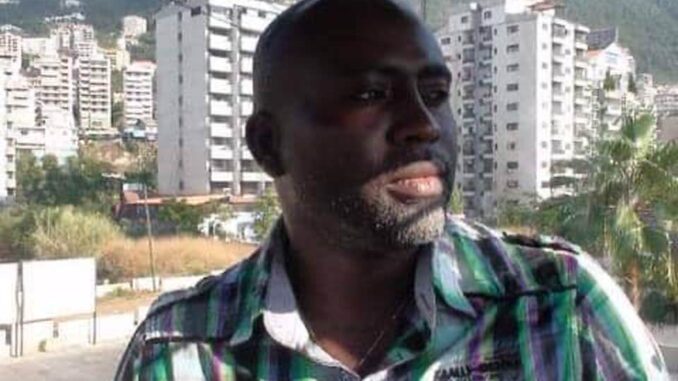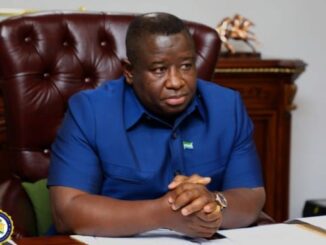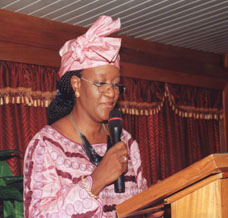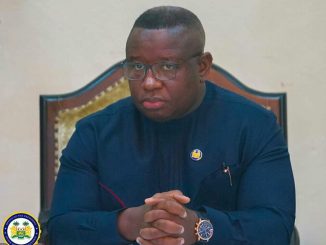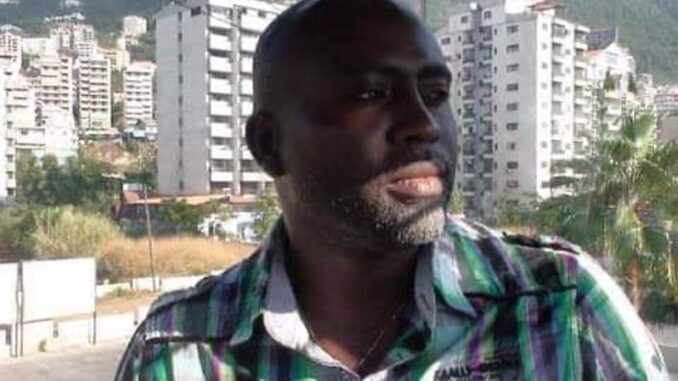
By Sylvanus Fornah Koroma
In the aftermath of the disputed June 24TH 2023 elections in Sierra Leone, a political impasse ensued between the two rival political parties (All Peoples Congress – APC and Sierra Leone People’s Party – SLPP).
The opposition party (APC), aggrieved by what they believed to be an inaccurate announcement of results by the Electoral Commission under the proportional representation system, took a strong stance that they are not going to participate in any form of governance and that the announced elected members are not going to Parliament and the councils. They demanded the release of disaggregated results from every polling station and called for the use of Results Reconciliation Forms (RRFs) to verify and reconcile the announced results, thus keeping in line with the provisions as provided in sections 91, 92, and 93 of the Public Elections Act 0f 2022.
The Electoral Commission’s reluctance to release the detailed polling station results raised concerns of bias in favour of the ruling party. This situation was exacerbated by the fact that both local and international observers declared that no party had met the presidential election threshold of 55% in the first round, necessitating a runoff as per section 42 subsection (2) paragraphs (e) and (f).
Paragraph (e) provides thus: ‘no person shall be elected as President of Sierra Leone unless at the Presidential election he has polled not less than fifty-five per cent of the valid votes in his favour; and’ Paragraph (f) states: ‘in default of a candidate being duly elected under paragraph (e), the two candidates with the highest number of votes shall go forward to a second election which shall be held within fourteen days of the announcement of the result of the previous election, and the candidate polling the higher number of votes cast in his favour shall be declared President.
Three months after the controversial election results were declared in favour of the ruling government, the opposition’s unwavering position led to a severe setback. The country’s functionality was hampered, investor confidence eroded, and international partners hesitated to engage in business with Sierra Leone.
In response to this crisis, the local National Peace Commission facilitated a three-day dialogue, supported by international groups including ECOWAS, the African Union, and the Commonwealth. At the conclusion of the dialogue, leaders representing both the government and the opposition party signed ‘a communique.’ This document serves as a formal statement summarizing the key agreements and resolutions reached during the discussions, offering hope for a path forward in resolving the electoral dispute and its implications.
This document has sparked a whole lot of criticisms and discussions amongst the membership of the APC both at home and abroad. It therefore must be looked at microscopically, which I am now attempting to do with some critical lenses.
In the context of diplomatic discussions or negotiations, a communique is a formal written statement issued at the end of a dialogue or meeting. It typically summarizes the key points of agreement or decisions reached during the discussions. In this case, the communique signed at the end of the dialogue between the government (SLPP) and the opposition party (APC) outlined the terms, agreements, or resolutions they’ve reached to address the election dispute and its consequences.
This is what is on my desk as the communique that was signed on Wednesday October 18, 2023:
MEDIATED DIALOGUE BETWEEN GOVERNMENT OF SIERRA LEONE AND THE ALL PEOPLES CONGTRESS PARTY.
(16th – 18th OCTOBER, 2023) AT THE BINTUMANI HOTEL, FREETOWN, SIERRA LEONE
AN AGREEMENT FOR NATIONAL UNITY
PREAMBLE
- Welcoming the 3-day mediated dialogue between the Government of Sierra Leone (GoSL) and the All Peoples Congress (APC) Party, (herein after referred to as “the Parties”), to address the political impasse post the June 24th 2023 multitier elections;
- Thanking the mediators of the dialogue – African Union (AU), Economic Community of West African States (ECOWAS), the Commonwealth, and the Independent Commission for National Cohesion (ICPNC) for their effort to bring the Parties together;
- Noting that the laws of the Republic of Sierra Leone, especially the Constitution of Sierra Leone (Act 6, 1991) are sacrosanct;
- Given that the Parties to the mediated dialogue (Government of Sierra Leone – GoSL) and the All Peoples Congress Party – APC) note records of cases filed in the Supreme Court against the Electoral Commission – ECSL;
- Noting that the All Peoples Congress has continued to ask for the release of the “summary of all statements of the results from the polling stations” (Section 92, Public Elections Act, 2022) for the 24th June 2023 multi-tier elections;
- Noting further that the All Peoples Congress continues to demand for the immediate resignation of the Chairman and Chief Electoral Commissioner and all Regional Commissioners of ECSL;
- The Government of Sierra Leone notes the provisions in Section 32 of the Constitution of Sierra Leone (as amened);
- The APC Party acknowledges the relevance of Section 2(1) of the Right to Access Information Act, 2013;
- Noting that no individual or candidate who participated in the June 24th 2023 elections challenged the gazetted results (20th July, 2023) in court.
RESOLUTIONS
The Parties resolved the following:
- His Excellency the President to make a ‘National Address’ on dialogue, unity, cohesion, and peace.
- The APC will end its “non-participation in governance”
- His Excellency the President, in consultation with the APC party, will constitute a cross party Committee on Electoral Systems and Management Bodies Review with a three-way leadership nominated by the Government of Sierra Leone; the APC Party and Development Partners. This body will examine the electoral systems, structures and processes of the 2023 multi-tier electoral cycle. The committee will also be informed by previous elections with a view to highlighting and addressing the contentious issues of elections and result management including the collation, verification, authentication and publishing of electoral data consistent with international best practice to enhance the credibility of all future elections in Sierra Leone that guarantees elections to be free, fair and credible.
- The Terms of Reference will be developed under the joint leadership of the committee within 30 days
- The duration of the committee will be 6 months from the date of establishment
- The Recommendations from the Committee shall be actionable and implementable
- The committee will be gender-balance
- The parties to the dialogue agree to the following:
- Release of any persons arrested, detained and/or for alleged elections and civil protest (informed by a list to be submitted by the APC and other Political Parties and considered by the Government of Sierra Leone)
- The discontinuation of any politically motivated court cases against the APC and their supporters (based on a list to be submitted by the APC and other parties and considered by the Government of Sierra Leone)
- Support the resettlement of any Political Party supporters internally and externally displaced due to political intimidation, attacks and harassment (informed by a list to be submitted by the APC, and other parties and considered by Government of Sierra Leone) as soon as possible
- That upon assumption of their elective governance positions, all elected APC officials (Members of Parliament, Mayors, Chairpersons, Councillors) will have the issue regarding their entitlements addressed accordingly by the appropriate institutions
- Parliament to address any issues as it relates to the leadership, composition of Committees and representation in International Parliaments on behalf of APC (the composition of Committees and International Parliaments must reflect APCs share of seats in accordance with the Constitution of Sierra Leone)
- Both parties agree to the institutionalisation of an inter-party dialogue framework between the APC, SLPP, and other political parties. This will be facilitated by the government
- Both parties commit to re-engineer and rekindle the relationship within the national socio-political ecosystem such as between His Excellency the President and former political leaders (former leaders (former President and the Vice Presidents); the APC and SLPP leadership, etc.
- The government of Sierra Leone and the APC party strictly condemn all citizens at home and abroad who incite violence, spread hate speech and disrupt national cohesion (online and offline) and government will continue all efforts to bring those involved to justice
- There shall be actions and commitments by the Parties to implement the agreements reached during this mediated dialogue. To this end, the Government of Sierra Leone and the APC Party commit to the establishment of an independent committee of ‘Moral Guarantors’ whose membership shall be agreed by the Parties to support and monitor the implementation of this Agreement.
Signed: Government of Sierra Leone and the All Peoples Congress Party
With a critical lens, the above communique is an excellent stage to start the real journey to ‘Justice’ and the restoration of Democracy since they went into comma on June 27th 2023, when the Chief Electoral Commissioner Mohamed K Konneh deliberately ignored the statutory provision as provided in section 93 of the Public Elections Act, 2022 (PEA 2022), for the publication of the elections results as soon as possible when he has made the announcement of the results.
This statutory provision is tied to section 54 subsection (1) of the same and it particularly provides for the challenge of election of President. The rationale to read these two provisions in tandem is based on the evidence for petition as explicated in reason for dismissing the Sylvia Blyden case (SC. CIV. APP. 6 & 7/2018) against the Electoral Commission wherein she failed to provide evidence of the results. In the said case it was held in paragraph 131 that “In conclusion the Petitioner’s have failed refused or neglected to produce any evidence to rebut the fact that Brigadier Rtd Julius Maada Bio now president was validly elected as President of the Republic of Sierra Leone.” So, without evidence of the publication of results, APC nor any other person has case good enough for the Supreme Court to look into for a positive judgment.
Furthermore, the refusal of the Chief Electoral Commissioner cannot be disconnected to section 120 of the PEA, 2022, that deals with the falsification of return of election which includes a penalty of 5 years imprisonment. This is in my opinion the principal reason for his refusal to publish the results, otherwise the there is no reason for not publishing the elections results as provided for in sections 91 and particularly 92 and 93 of the PEA, 2022.
Having set the background of this analysis which has to do with the real issue for the dialogue and the subsequent Communique demanding the PUBLICATION OF THE JUNE 24TH 2023 MULTI-TIER ELECTIONS BY THE ELECTORAL COMMISSION, it is now necessary to delve into the critical aspect of the dialogue which makes it interesting and hope that Sierra Leone is now on the verge of resuscitating Justice and Democracy provided the parties involved are ready and genuine to do so.
There are two operative words in the communique that caught my attention, and we need to establish a common understanding on. The use of the terms “resolved” and “agree” in a communique can have legal implications, though it often depends on the specific context band wording of the document.
Now, in this communique, it has been resolved in point 2 of the resolution that the APC will end its “non-participation in governance.” The communique’s wording is indeed crucial. The statement that the APC will “end its non-participation” suggests a commitment to re-engage in the political process. However, the subsequent resolution regarding agreeing to create a cross-party committee for electoral review indicates a more comprehensive approach.
Now, there is a spark of curiosity about whether the APC elected representatives should immediately take their seats! It would be advisable to carefully review the communique’s wording and consider the legal and practical implications.
The APC has the option of re-engaging in governance immediately and risk failing their real objective to get far better representation. The second option is the phased approach, which suggests waiting for the recommendations from the committee to take effect. This second option is what will test the sincerity of the Government to ensure the resuscitation of Justice and Democracy in Sierra Leone.
In nutshell, points 2 and 3 are the most critical resolutions that will steer the country forward, and without the implementation of point 3, point 2 is pointless. Therefore, APC elected representatives need not be in haste to take their seats otherwise they would have defeated the purpose of the whole dialogue and the communique.

